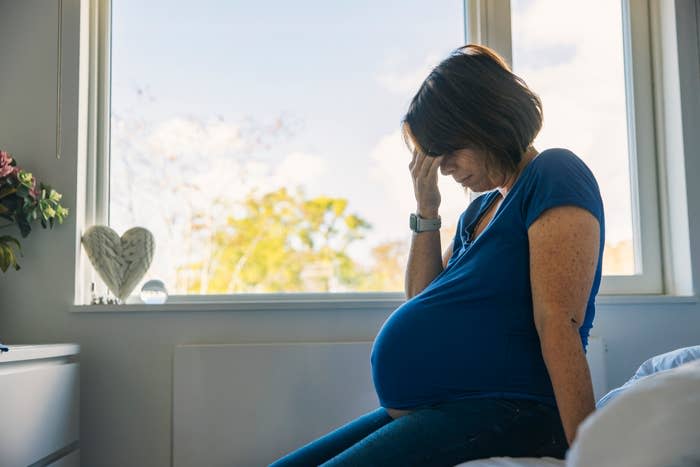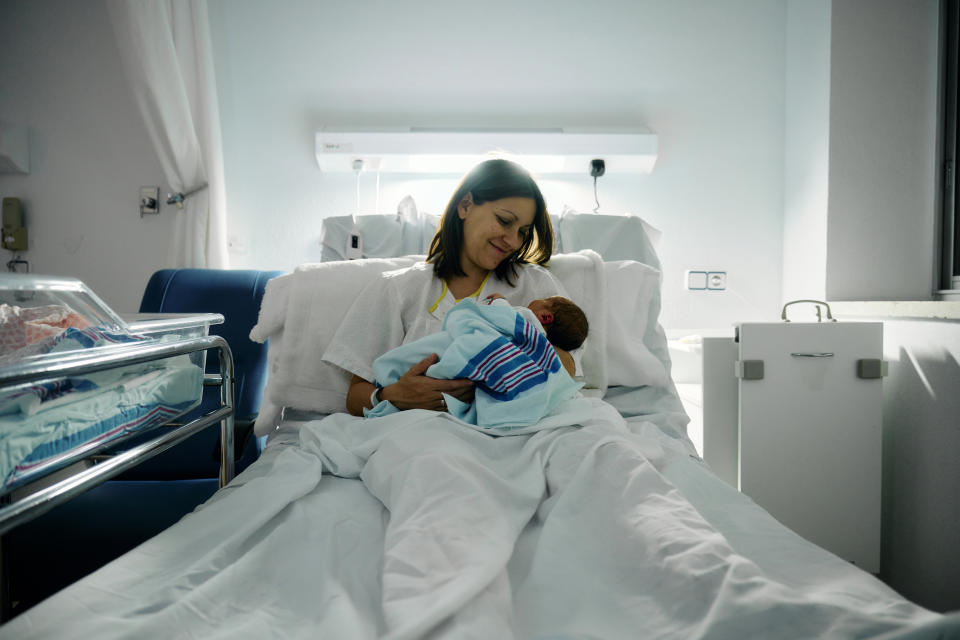While a woman’s body is capable of doing incredible things, there are also many things that we don’t even realize our bodies could go through until it sadly happens to us. Women of the BuzzFeed Community bravely shared their stories to remind women to always advocate for themselves, and if they feel like something is off, it usually is. Here is what they shared:
Note: Some responses have been edited for length and/or clarity.
1.“Cryptic pregnancies are very real. My uncle and aunt tried for ten years and gave up after my aunt’s second miscarriage. Back in 2021, she went to the hospital complaining about her stomach and gave birth at 45. Nothing was crazier than waking up and finding out my 56-year-old grumpy uncle was now a father.”

2.“So many times I see early perimenopause mentioned, but I’ve never seen a comment saying that it can come later than usual. I’m 48, and I asked my doctor to run tests, and she said I’m not near perimenopause, let alone menopause. I’ve been dealing with periods for 35 years already, and I am convinced I’ll be dealing with this crap until the day I die.”
—stephaniev23
3.“Did you know that not all women get periods every month, or even bi-monthly? It is possible to ovulate even without a period. I get my period twice a year, in March and October. It has been this way for at least 6-7 years now. However, in 2019, I found out I was pregnant at 24 weeks, which meant that conception had happened during one of the months that I didn’t have a period. (Which also means I wasn’t missing any periods, hence not knowing I was pregnant). If you have irregular periods, seeing a medical professional to find out why is important. However, if your periods are irregularly regular (irregular in general, but consistent for you), it’s also important to tell them that.”


4.“The Bartholin’s cyst! I am recovering from surgery for mine. I had discomfort ‘down there’ and thought it may have been from a recent period, but it just got worse. After a round of antibiotics and pain that I couldn’t handle, I ended up in the ER. The doctor who saw me said she couldn’t really see anything and that I should go home, take painkillers, and wait for it to ‘pop’ on its own. I couldn’t imagine another day of this pain, so I made her put her hand where the pain was. She then called over the ob-gyn who was on call.”
“Fast forward two hours, and I was in emergency surgery to have it drained. It was about the size of a golf ball, and if we’d left it any longer, I would have got septicemia. While they were operating, they found cysts on my uterus, which turned out to be the cause of the heavy bleeding I was having each month and the anemia I had because of that. 2024 has been a wild one so far!”
—patty_mayo
5.“The one that always gets me is how much more likely it is for neurodivergent women to have menstrual issues compared with neurotypical women. We’re more likely to have terrible cramps, heavy bleeding, PCOS, and PMDD, and then, of course, a lot of us have sensory issues around the bleeding and the products available to manage it. The fact that women are rarely believed about menstrual problems OR being ND means there isn’t a whole lot of info available about this, so I don’t know what my body and brain are doing that makes periods so awful. I only got my endometriosis AND autism diagnoses in my 30s, and finding out literally anything about their relationship since then has been extremely difficult because the research just isn’t being done.”


6.“Hormonal imbalances can also cause severe and debilitating migraines. My grandma had been suffering from migraines from the time she was around 12. They were bad; she had to lie in bed in a dark room with a cold rag on her head all day. This went on for decades. No doctor could figure out why she was getting these. They just gave her painkillers to help. This was the 1950s-80s, mind you. Then, she developed ovarian cancer. To stop it, she had a complete hysterectomy and double ovarian removal. After that, she never had a migraine again.”
“The procedures instantly fixed a decadeslong issue. They started doing studies on women’s hormones and migraines in the ’90s, I believe, and showed there is a definite link: if your hormonal levels are out of whack, it can cause migraines. It started at 12, obviously, because hormone levels change when a girl gets her period. So, if you have really bad migraines, you might want to talk to your OB/GYN about a possible hormonal cause.”
—lalalace1640
7.“Here’s one that not many people seem to know about: certain cancers are common during pregnancy. Last year, I had what’s called a molar pregnancy; it happens when there’s either no genetic material in the egg or two sperm fertilizing the egg at the same time. The genetic abnormality causes a cyst to grow and then multiple fluid-filled sacks along with some fetal tissue that’s not viable. Left untreated, the cyst can grow into your uterine wall and, in some people, turn cancerous.”


8.“I learned as a woman in my late-30’s that virtually everything I’d been taught about hymens — or, rather, what had been passed down in half-whispers from friends who had older sisters, etc. because none of my health or so-called ‘sex ed’ classes taught anything about hymens — was wrong.”
“When I started working as a Sexual Assault Victim Advocate and working on multiple SANE (Sexual Assault Nurse Examiner) exams every month, I learned a lot from the SANEs about how female bodies do and do not actually work.
Most importantly, hymens aren’t like we’ve been taught to picture them. We’re always given this picture that shows the hymen as a flat skin plane. Instead, you should picture it as one of those scrunchy hair ties. Picture making a ‘bird head’ by closing all your fingertips on one hand together. Putting the small scrunchy around your closed fingers and then opening and closing them gets bigger and smaller again. Estrogen is what makes the hymen most pliable—most scrunchy. When we are born, we have leftover Estrogen from our mother for a couple of years. Our hymen is really pliable then. It becomes less so when we are children, and the estrogen wanes and then becomes more pliable again when we hit puberty.
So, when the police or CPS would come to me, as a child’s advocate on the call, or to the SANE, and ask, ‘Well, did something happen? Was the hymen broken?’ we would have to explain to them what I said above. Women should have better access to ACCURATE education about our bodies in the US.”
—moultonpatricia
9.“You still ovulate with an IUD. So you might have all the symptoms but don’t typically bleed.”
—deadzy
10.“Two years ago, I had a decidual cast, which I had never heard of until I had one. Normally, when you have your period, the uterine lining dissolves into blood and sheds over several days. With a decidual cast, the tissue stays solid and emerges in one large mass in the shape of your uterus. My periods are typically light, with minimal cramps due to my birth control. When I had the cast, the bleeding was so heavy it was almost a constant stream, and I couldn’t stand up from the pain. Both of these almost completely went away as soon as the cast had passed, but then I was freaking out and thought I had cancer. If you have no idea it’s possible, it’s very alarming to see something the size of a lemon come out of your vagina.”
—abigaill46582bb76
11.“My mom’s thyroid stopped working when she was pregnant with my older brother. No clue why, but thankfully, my younger brother and I were both full-term.”


12.“Diastasis recti — when your abs separate and have a gap. Also, pelvic organ prolapse, which is just what it sounds like. When your bladder or uterus tries to vacate your body. Both of mine weren’t mentioned until my bladder tried to leave when I was 34 after giving birth to two kids in two years.”
13.“While pregnant, I developed something called an ‘incarcerated urethra.’ It meant that my urethra was being pinched off, so I couldn’t urinate. Luckily, mine only lasted about a day and a half, and I could get myself to pee by pushing on a certain spot, but some women have to get catheters put in.”
—bluecoyote20
14.“I had a blood clot in my spleen as a result of severe pancreatitis last year. The ER doctors put me on Eliquis (a blood thinner) even knowing I wasn’t on birth control and got my period monthly. Next period, I started bleeding HEAVILY, with huge clots. I went to my primary doctor, who insisted it was a long period and couldn’t have been caused by the blood thinner. It persisted, and I called my OBGYN. They also said it was normal. Finally, after passing two blood clots the size of my fist, I insisted on an in-office visit. The OB sent me to the ER, I was bleeding out. I needed three blood transfusions and even then had to spend another week in the ER because my hemoglobin was so slow my body was barely clinging to life.”


15.“I have PCOS and we were trying to find an alternative to the pill for me. I had an IUD placed. After two years, it dislodged itself. The gyno went to put a new one in but couldn’t get it immediately. He tried for three straight minutes, just trying to force it in. He took a break and tried again and still couldn’t. Finally, I couldn’t handle it anymore and decided to try for the Nexplanon, which made me bleed nonstop, so I ended up just having to go back to the pill regardless.”
—Lollypop
If you have your own story, share it with me in the comments below!
via The Novum Times

